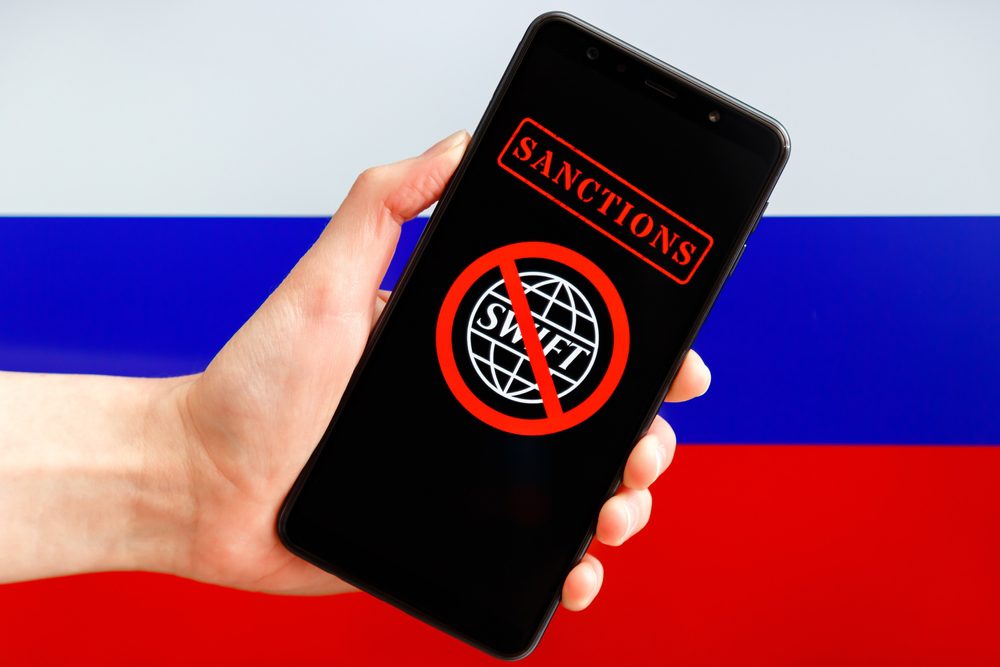
In the days following the Russian invasion of Ukraine, calls resounded around the world for Western countries to ban Russia from the international banking transfer system, SWIFT.
After days of hesitation, the G7 finally heeded the call to place the toughest sanctions yet on Russia, including banning Russian banks from SWIFT.
“As Russian forces unleash their assault on Kyiv and other Ukrainian cities, we are resolved to continue imposing costs on Russia that will further isolate Russia from the international financial system and our economies,” the UK, Canada, the U.S., and the European Union announced on Sunday, February 28th. They are committed to “ensuring that selected Russian banks are removed from the SWIFT messaging system,” the press release said.
Additionally, the countries announced that they were blocking the Russian Central Bank from accessing its international reserves, as well as limiting the “the sale of citizenship—so called golden passports” that allows Russian oligarchs close to Putin to access global banking through other countries. The countries also announced that they would form a “transatlantic task force” for identifying and freezing the assets of sanctioned individuals and companies that exist within our jurisdictions,” to ensure that previous sanctions against Russian oligarchs are implemented.
In an independent statement, the German government said the measure would apply to “Russian banks that are already sanctioned by the international community and, where necessary, additional Russian banks,” Politico reports.
Germany had been one of the countries most resistant to banning Russia from SWIFT, as it relies heavily on Russia natural gas.
On Monday morning, the Russian ruble fell drastically and gas and oil prices jumped.
This is not the first time SWIFT has been used as a playing chip in geo-politics. All Iranian banks were banned from SWIFT for several years to curb their nuclear ambitions.
Banning Russia from SWIFT may be one of the quickest ways to cripple Russia financially, but some European countries hesitated to enact such a sanction because it makes commerce with the country nearly impossible. Trade goes both ways, and limiting commerce with Russia also deprives its trading partners of benefits. For Europe, this largely applies to the products it imports from Russia, most importantly, energy in the form of natural gas and petroleum. About a third of Europe’s natural gas comes from Russia: it ensures electricity is available and that homes are heated. Banning Russian banks from SWIFT would act as a default sanction on energy, since without SWIFT, European countries would basically have no way to pay for Russian gas and oil.
Some analysts fear that Russia may retaliate by simply closing gas pipelines to Europe. Either way, without Russian natural gas, Germany and other European countries will lose.
Other areas of the world are responding to the possibility of energy shortages in Europe. Spain, which gets its natural gas from northern Africa Morocco, has already started to send natural gas to central Europe. EU Commission President Ursula Von der Leyen has also been in intense negotiations to increase gas imports from Norway, Azerbaijan, and Qatar.
The G7 knows this and hopes to keep both gas, and the money to pay for it, flowing through the same pathways they’ve always used.
Even as they announced their move, allies were still working to find ways to limit its impact on energy prices, Politico reported. The U.S. and the EU were coordinating with SWIFT to see if there were ways to identify energy transactions in the system or if exempting certain banks would limit the potential disruption of energy markets and supply.
A senior U.S. administrator commented on the approach: “We are going to go institution by institution in terms of those that are removed from the network,” Politico reported. “And we’ll pick those very carefully to maximise the impact on Russia and minimise the spillovers to Europe and the EU and the global economy.”
But some experts fear that one exemption could lead to more, and render the sanctions meaningless.
For Ukrainians, the latest sanctions package is the first meaningful international sanction against Russia.
Ukrainian Prime Minister Denys Shmyhal welcomed the measure, writing in a tweet, “Appreciate your support and real help in this dark time. Ukrainian people will never forget this! Keep holding the line! We are on our land.”